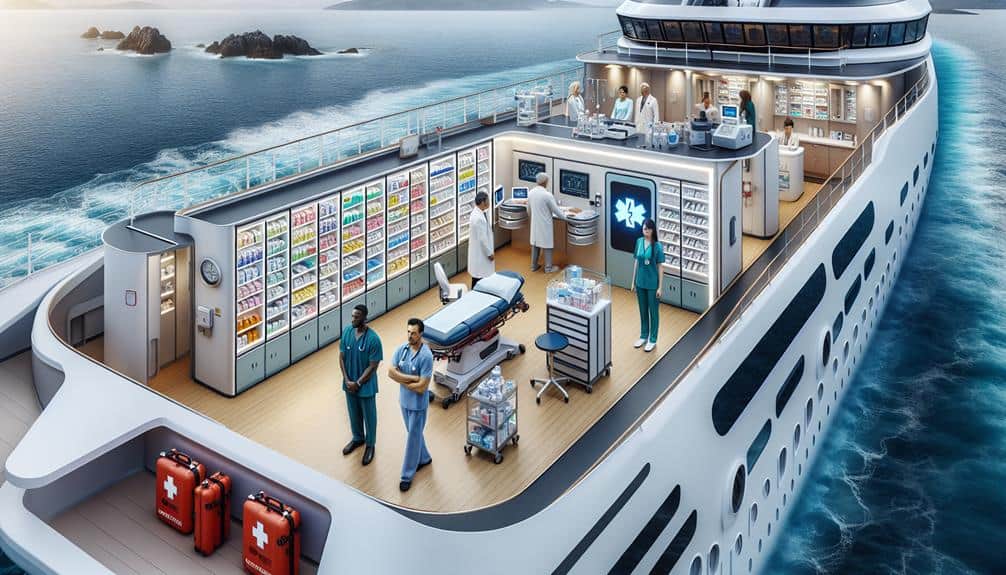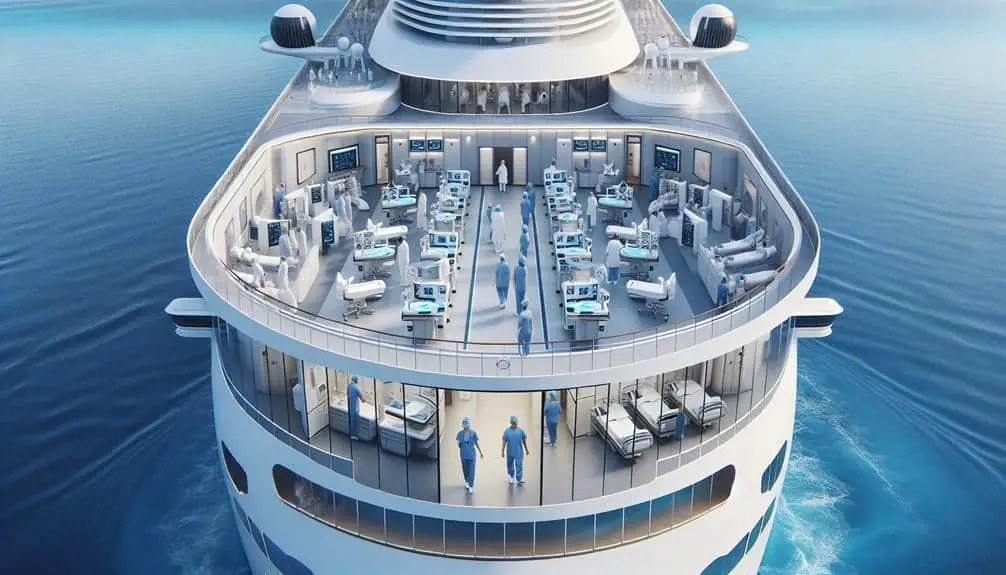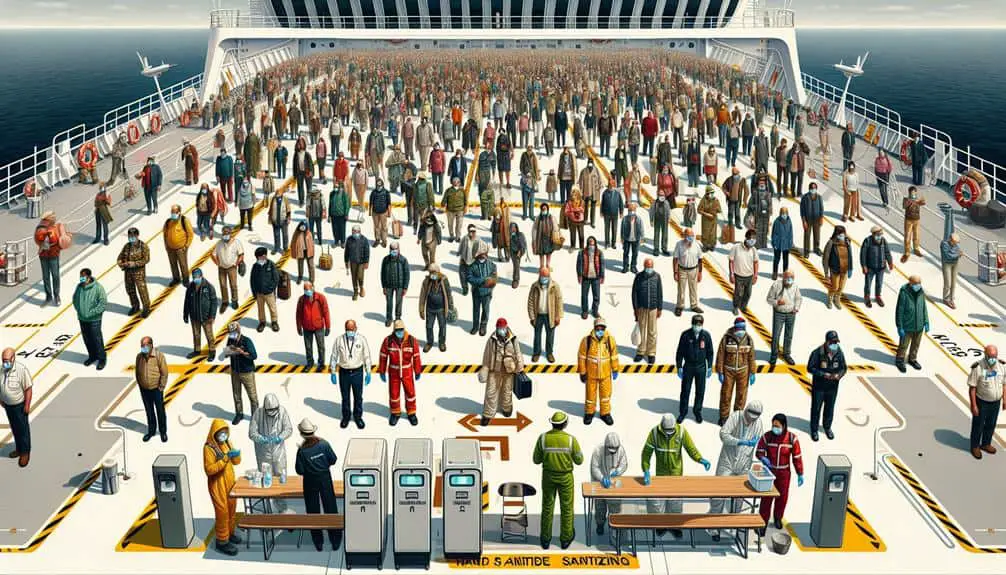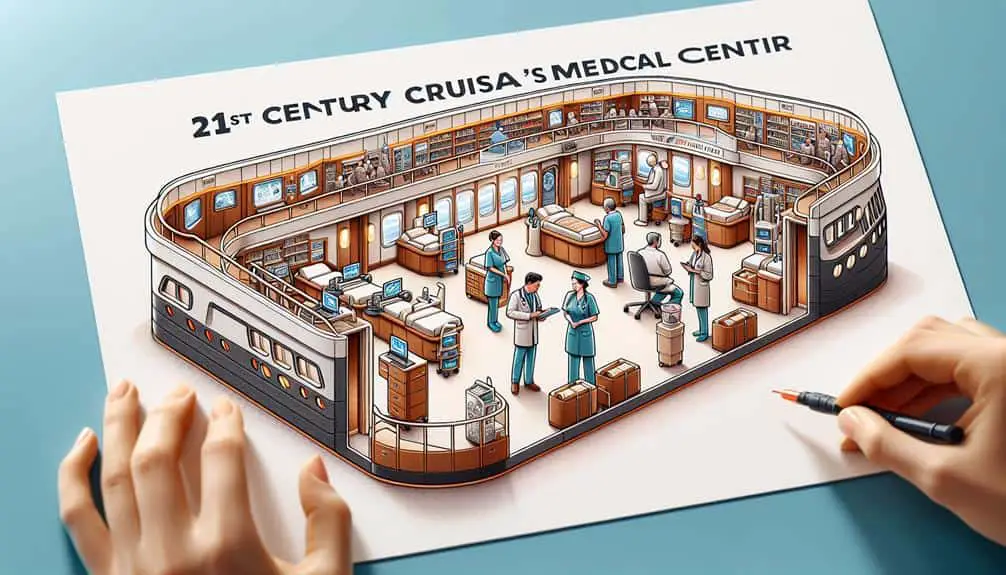On cruise ships, you'll find high-quality medical facilities. The staff is highly skilled with advanced certifications. They receive continuous training for emergencies. The onboard equipment is state-of-the-art. From diagnostic tools to extensive supplies, they're prepared. In case of a medical crisis, there are structured response protocols. They guarantee patient care while maintaining confidentiality. Isolation facilities are in place for contagious illnesses. Telemedicine enhances care without transmission risks. Evacuation procedures are rigorous, guaranteeing swift and safe transport. These facilities prioritize your well-being onboard. There's more to learn about the thorough healthcare approach on cruise ships.
Key Points
- Comprehensive onboard medical equipment for prompt care.
- Trained medical staff with specific certifications.
- Structured emergency response protocols in place.
- Isolation facilities for contagious illnesses with telemedicine support.
- Evacuation procedures for swift and safe transport in emergencies.
Medical Staff Qualifications
When evaluating medical staff qualifications on cruise ships, consider their education, experience, and certifications. Staff training plays a vital role in ensuring that medical professionals on board are equipped to handle a diverse range of medical emergencies. Cruise lines often have specific certification requirements that medical staff must meet to guarantee the highest level of care for passengers. These certifications may include Advanced Cardiac Life Support (ACLS), Pediatric Advanced Life Support (PALS), and Basic Life Support (BLS) certifications.
Medical professionals working on cruise ships typically have extensive experience in emergency medicine, critical care, and general practice. This diverse background enables them to address a wide array of medical issues that may arise during a voyage. Additionally, ongoing training and professional development are essential for medical staff to stay current with the latest advancements in medical care and technology.
Onboard Medical Equipment
To guarantee the highest quality of care for passengers, the onboard medical facilities of cruise ships are equipped with a comprehensive array of medical equipment. Healthcare technology plays an essential role in making sure that medical staff can provide prompt and effective care to passengers in need. These facilities are equipped with state-of-the-art diagnostic tools such as X-ray machines, ultrasound equipment, electrocardiograms (ECG), and important sign monitors. Additionally, cruise ships stock a wide range of medical supplies to handle various health emergencies that may arise during the voyage. These supplies include medications, wound care materials, intravenous fluids, and respiratory support equipment.
Having access to advanced healthcare technology and a well-stocked inventory of medical supplies enables the onboard medical staff to assess and treat a diverse range of medical conditions promptly. This meticulous preparation ensures that passengers can receive the necessary care while at sea, providing peace of mind to both travelers and crew members.
Emergency Response Protocols
Utilizing a structured approach, emergency response protocols on cruise ships are meticulously designed to efficiently address medical crises that may arise during voyages. The protocols encompass emergency triage, ensuring that individuals with the most urgent medical needs receive prompt attention. Cruise ships have designated medical teams trained to handle various emergencies, equipped with the necessary skills and resources to provide immediate care. These teams follow specific response protocols that dictate actions to be taken in different scenarios, maintaining a high standard of care onboard.
Patient confidentiality is a critical aspect of these protocols. Medical staff on cruise ships adhere to strict guidelines to safeguard patient information, ensuring privacy and upholding ethical standards. From the initial assessment through treatment and follow-up, maintaining patient confidentiality is paramount. These protocols are in place to protect the well-being and privacy of passengers requiring medical assistance while onboard. By adhering to these established guidelines and protocols, cruise ships can effectively manage medical emergencies and provide passengers with the necessary care and support during challenging situations.
Isolation Facilities and Procedures
Effectively supervising potential contagious illnesses onboard, cruise ships maintain isolation facilities and procedures to guarantee the safety and well-being of all passengers and crew members. In the event of infectious diseases, cruise ships have established quarantine protocols to prevent the spread of illnesses among individuals on board. Isolation facilities are equipped to provide necessary patient care while minimizing the risk of transmission to others.
Cruise ships also utilize telemedicine technology to make sure that medical professionals can remotely assess and monitor isolated individuals. This technology allows for efficient communication between onboard medical staff and shoreside healthcare providers, enabling timely medical consultations and treatment recommendations. By incorporating telemedicine technology into their isolation procedures, cruise ships can enhance the level of care provided to patients while maintaining the safety of all individuals onboard.
The combination of quarantine protocols, patient care, and telemedicine technology plays an important role in managing potential contagious illnesses effectively on cruise ships.
Medical Evacuation Procedures
In cases of medical emergencies requiring evacuation from cruise ships, designated procedures guarantee swift and safe transport for individuals in need of advanced care. Cruise ship medical staff undergo rigorous evacuation training to ensure they can efficiently respond to emergencies. The crew is trained to assess the situation, stabilize the patient, and determine if evacuation is necessary.
Emergency transport off the ship typically involves coordination with local authorities or air-sea rescue services. Cruise ships have protocols in place to quickly arrange for evacuation, whether by helicopter, tender boat, or other means of transportation. Medical evacuations are carefully coordinated to provide the necessary care and ensure the safety of both the patient and the medical team during transport.
Passengers should familiarize themselves with the ship's evacuation procedures in case of a medical emergency. Being aware of how the process works can help expedite the necessary actions and ensure a prompt response to any health crisis that may arise while at sea.
Frequently Asked Questions
Are Passengers Required to Pay for Medical Services on a Cruise Ship, and if So, How Are Charges Typically Handled?
Passengers on a cruise ship typically need to pay for medical services. Charges are managed through onboard accounts or insurance coverage. Medical staff are qualified professionals, ensuring prompt and efficient emergency response for any health concerns you may encounter while at sea.
What Types of Medical Conditions Are Typically Treated on a Cruise Ship, and Are There Any Conditions That Would Require Passengers to Be Disembarked?
When managing medical matters onboard a cruise ship, emergency responses are swift, and passenger medical evaluations are thorough. Various conditions, from minor ailments to more serious issues, are typically treated, but certain cases may necessitate disembarkation for specialized care.
Can Passengers Bring Their Own Medications on Board a Cruise Ship, and Are There Any Restrictions on Certain Types of Medications?
You can bring personal medications on board a cruise ship, but there are regulations. Prescription meds need to be in their original packaging, and some controlled substances may have restrictions. Onboard access varies.
Are There Any Limitations on the Age or Health Status of Passengers Who Are Allowed to Board a Cruise Ship, in Terms of Accessing Medical Facilities?
In your quest for adventure on the high seas, age restrictions and health limitations may impact your ability to access medical facilities on a cruise ship. Understanding these factors guarantees a safe voyage.
How Often Are Medical Staff on a Cruise Ship Required to Undergo Training or Certifications to Ensure They Are Up-To-Date on the Latest Medical Procedures and Protocols?
To guarantee excellent care, medical staff on cruise ships must meet rigorous training requirements and maintain up-to-date certifications. They continuously enhance their qualifications to be proficient in the latest medical procedures and protocols.



